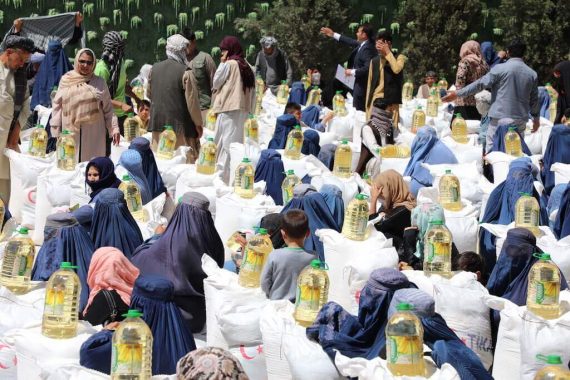Afghanistan is facing the collapse of essential services as food aid runs out, according to U.N. agencies, who released a rapid appeal for more than $600 million on October 5, 2021 to sustain approximately 11 million people across the crisis-plagued country until the end of the year.
Due to security concerns, staff evacuations, closures, and legal difficulties, most of the former Afghan government is no longer operating due to the recent Taliban takeover. Humanitarian relief and other assistance given by the U.N. agencies and civilian groups as a result have been severely restricted. U.N. Secretary-General António Guterres said on August 31, 2021 that “a humanitarian catastrophe looms” in Afghanistan and asked donor countries to “dig deep” to support an emergency flash appeal. The United States and the European Union have declared that humanitarian help will continue to be provided to Afghanistan.
Following the Taliban’s takeover, the U.S. froze $7 billion in Afghan reserves, while the International Monetary Fund (IMF) froze funding to the country, including hundreds of millions of dollars in Special Drawing Rights, which may be turned into currency during times of crisis, according to the IOM. The Central Bank of Afghanistan can only get a fraction of the money it needs. As a result, Afghan banks’ coffers are unable to be easily replenished, resulting in ATMs running out of cash and the imposition of withdrawal limitations.
The developing situation has created a significant disturbance and threatens Afghanistan’s critical winter wheat season, which is about to start.
An IMF spokesperson stated, “As is always the case, the IMF is guided by the views of the international community. There is currently a lack of clarity within the international community regarding recognition of a government in Afghanistan, as a consequence of which the country cannot access SDRs [special drawing rights] or other IMF resources.”
The developing situation has created a significant disturbance and threatens Afghanistan’s critical winter wheat season, which is about to start, the Food and Agriculture Organization of the United Nations (FAO) warned of a major fundraising conference.
“One in three Afghans are acutely food insecure, a situation that is dramatic by any stretch of the imagination,” said FAO Director of the Office of Emergencies and Resilience, Rein Paulsen, speaking from Islamabad.
Concerns regarding aid funding have been raised by Associate Asia director of Human Rights Watch, Patricia Gossman stating “Donor governments are understandably uneasy about providing assistance and funding to Afghanistan under the Taliban given their terrible rights record and newly emerging abuses.”
She emphasized that in order to avoid a worsening of the food scarcity crisis in Afghanistan, donors should agree to fund international agencies and non-governmental organizations that can offer emergency food, health, and education aid, as well as develop a strategy for dealing directly with the Taliban.
Recommended
The complex set of sanctions imposed on the Taliban by the United Nations Security Council, as well as sanctions imposed by the United States, the European Union, and many other governments, should be reviewed to ensure that they do not obstruct the delivery of humanitarian aid by nongovernmental organizations.
Uncertainty looms about the type of administration the Taliban will form; it’s a crucial concern for both international actors holding Afghanistan’s reserves and humanitarian organizations halting programs and financing. However, at what cost will withholding the Taliban monetary assets negatively impact Afghan food scarcity and a growing humanitarian crisis?





